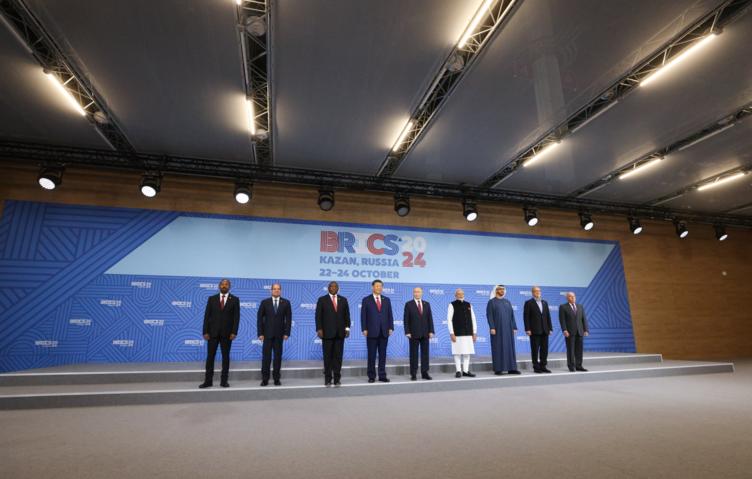The BRICS Summit in Kazan, Russia (October 22-24, 2024), is another Kremlin’s attempt to emerge from international isolation and show its global influence. According to Moscow, this forum is supposed to demonstrate the unity of states opposing the Western dominance, but the reality is different.
Despite the efforts of the organizers, many key leaders opted not to participate in the summit personally. Serbia President Alexander Vučić refused the trip, fearing making relations with the European Union (which remains the most important partner) more complicated. Brazilian President Luiz Inácio Lula da Silva also did not arrive at the summit, citing a household injury. Despite the official version, it is possible that this has become a good excuse not to participate in a dubious event organized by an isolated country due to the war against Ukraine. As a result, Brazil was represented by the Minister of Foreign Affairs.
The summit was not attended by the leaders of Cuba and Argentina: Cuban President Miguel Díaz-Canel remained in the country, dealing with power outages, while the newly elected president of Argentina, Javier Miley, preferred to distance himself from the summit.
Such a refusal to participate in the BRICS summit is a serious blow to Russia’s ambitions, which seeks to use this format to demonstrate its international legitimacy and influence. Even Moscow’s allies, such as Kazakhstan, is not impressed by the idea of expanding the BRICS or open confrontation with the West. Russia faces difficulties in its attempts to evade an isolation caused by its aggression against Ukraine.
The visit of the UN Secretary General António Guterres to the BRICS Summit caused sharp criticism and questioned the UN neutrality. His participation in the event organized by the state, conducting an aggressive war against Ukraine, undermines the principles of the UN Charter, such as the respect of sovereignty and territorial integrity. Gutterres’ participation in the forum, where Russia promotes its version of the end of the conflict, risks being perceived as approval of its actions, which is a serious blow to the UN reputation and its ability to serve as an impartial facilitator in maintaining international peace and security.
This is unacceptable in a situation when Ukraine needs powerful international support to protect its territorial integrity. The visit of the Secretary General to this summit looks like an action that can weaken the UN peacekeeping role and undermine confidence in its objectivity.
The BRICS Summit ended on October 24 by the signing of the Kazan Declaration. However, it is obvious that this event did not change the international agenda. As in previous meetings, the forum was mainly used for ambitious statements about the “new multipolar world”, where the impact of the West is supposed to be weakened. However, the lack of concrete solutions and clear mechanisms only emphasizes the inability of Russia and its BRICS partners to confront sanctions and pressure from Western countries.
The Kazan Declaration emphasizes the importance of strengthening the international peace and security, as well as the need to reform a multipolar system of global relations. Particular attention is paid to an increased role of developing countries, which should contribute to fair global development. However, despite the ambitious goals, the declaration is nothing but general promises, with no a roadmap for its achieving. There is no practical mechanism for implementation of the plan to use national currencies in trade between the BRICS countries as an alternative to the dollar.
The call to the peaceful settlement of the conflict in Ukraine through the dialogue looks like ordinary diplomatic rhetoric,. This may indicate the existence of internal disagreements among the participants of the BRICS on the war, where Russia’s support is blurred.
The expectations that BRICS would become a viable alternative to Western financial and political institutions were not justified. Russia actively promoted ideas about creating its own financial system, including SWIFT, but most of the member countries are not ready to support such initiatives. This confirms that BRICS, despite its declarations, is simply a scenery, unable to offer effective solutions to key global issues.
The weak results of the BRICS summit and the lack of real actions by its participants is contrasted with a high international support for Ukraine. Most of the world countries, including key European partners, the USA and others, continue to support Ukraine in its struggle for sovereignty. Moreover, many countries presented at the BRICS summit, avoid open support of Russia, preferring to balance between cooperation with the West and maintaining relations with Moscow.
The recent US decision to send Ukraine 20 billion US dollars at the expense of frozen Russian assets is an example of significant international support. These funds will become part of a larger assistance package coordinated by the G7 countries, which includes a loan of 50 billion US dollars of frozen Russian assets. A significant part of these funds will be used for the military needs of Ukraine, and the other — for financial support.
In addition, on October 23, the EU Council decided to provide Ukraine with a loan of up to 35 billion euros, coordinated by the G7 institutions. This shows Western desire to force Russia to pay for its aggression. The total volume of frozen Russian assets abroad is estimated at about 300 billion dollars, which creates a historical opportunity to use these funds for the restoration of Ukraine and force the aggressor country to bear financial responsibility for its actions.
Thus, the summit in Kazan, despite the statements of its organizers, did not become an event capable to overcome Russia’s international isolation. The world continues to support Ukraine, and BRICS is not about real actions.

